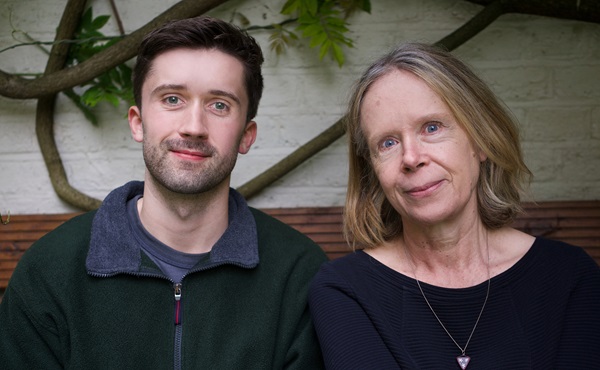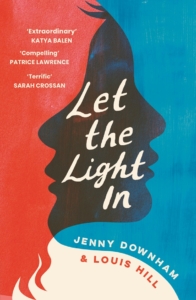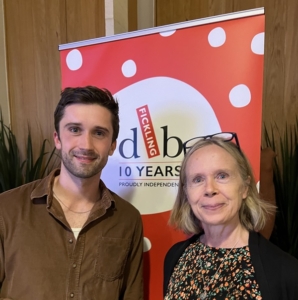
Letting the Light In: a conversation between co-authors Jenny Downham and Louis Hill
 Writing partnerships are not all that unusual, but it’s rare that the co-authors are mother and son. That’s the case with Let the Light In, by Jenny Downham and Louis Hill.
Writing partnerships are not all that unusual, but it’s rare that the co-authors are mother and son. That’s the case with Let the Light In, by Jenny Downham and Louis Hill.
In the spirit of authorial collaboration, we invited them to interview each other.
Jenny to Louis: Imagine I’m a movie director with a big budget! Give me your elevator pitch for Let the Light In.
Louis: A tragedy in the past. A love affair and a game-changing offer in the present. Two siblings – Leah and Charlie, struggle to stay afloat whilst navigating grief, poverty and inner-city life. Both a mystery and a romance, this story is about family, power, money, art and what matters most in the end.
Louis to Jenny: This is your fifth novel but your first collaboration. What was different about your process this time?
Jenny: It was daunting to share early work with you (usually, no one sees it) and occasionally confusing to feel both parental nurture (everything my child does is wonderful) and professional tenacity (think you need to re-write this bit, son). Mostly, it was a joy to spend time exploring a story with someone who approaches it with such creativity and energy. I learned a lot! It’s lonely being back on my own again…
Jenny to Louis: You’re a professional actor and have written for the screen and stage but this was your first time writing a novel. What were the main differences?
Louis: How many roles novelists take on! When writing screenplays or for the theatre, you relinquish a degree of creative control to others. You won’t get final say over how the stage is lit or the scene is framed. You can’t direct the actors or manage the casting. With a novel, you’re the lighting designer, stage manager, director and every character as well as the writer. You control everything the reader is given and let their imagination do the rest.
Louis to Jenny: Who is this book for?
Jenny: It was written for 14+. The story looks at hidden grief, family, mental health and community. There’s a lot of love and laughter in it  too. Anyone who enjoys a complex contemporary story will hopefully enjoy it.
too. Anyone who enjoys a complex contemporary story will hopefully enjoy it.
Jenny to Louis: Which character did you find easiest to write/relate to the most?
Louis: We decided early on to alternate chapters with you writing Leah and me writing Charlie. This naturally meant I had affinity with him. He’s fifteen and trying to figure out his place within his family dynamic and the world around him. He’s growing up in London and must face all the challenges and adventures that brings. There’s some of myself in him alongside bits of other people, some careful research and a lot of imagination. He’s a unique concoction and I’m enormously fond of him.
As a side note, I’m sure you’d agree, that writing the younger sister Abby, was a lot of fun. I have a real soft spot for her, and she often feels like the heart of the story.
Louis to Jenny: 17-year-old Leah is in love with someone older and technically ‘unavailable.’ Why did you want to write about this?
Jenny: Intimate relationships, with all their shifting complexity and potential for heart ache are a reality for many young people and a novel is a safe space to explore difficult things. Different sides of the affair are highlighted so readers can bear witness to characters’ choices and hopefully understand why they make them. Other characters express varied and strong opinion when the relationship is discovered, which will hopefully prompt discussion among readers. I hope the book provides honest engagement with a complicated subject.
Jenny to Louis: Charlie struggles with anxiety in the book and finds it hard to share how he feels. How important was the theme of male mental health to you?
Louis: It’s a subject close to my heart and was always something Charlie was going to struggle with. I wanted to look at the impact anxiety and low self-esteem can have on a young person. Charlie’s journey shows how important it is to create space for young men to talk about their mental health and reach out when they need help.
I also wanted to give Charlie ways to process his grief creatively. In his darkest hours, his art is a comfort, but it also ends up being something he’s proud of. The story doesn’t just focus on Charlie and Leah’s problems but looks at the ways they manage to find joy in life. Ultimately, they let the light in!
Louis to Jenny: Lots of issues stem from things the characters choose not to say to each other. How important is it to have good communication within a family dynamic?
Jenny: Well, you and I are still talking after three years writing a novel together, Louis, so I’d say communication is vital! Though secrets do make for good narrative tension…
Leah and Charlie withhold truth because they feel shame about their actions. Also, to protect themselves and because they believe masking their own pain will help others. This is why we’ve highlighted community in the book – neighbours, friends, teachers – and the importance of noticing those around you. We also highlight the benefits of talking with someone you trust.
Jenny to Louis: Was it ever hard to switch from mother and son to professional writing partners?
Louis: I think we did a great job of compartmentalising. On days we worked in the same room to discuss structure, story or plot, we’d set a timer. Occasionally things might become heated but when that timer went off, it was into the kitchen for a cup of tea, leaving our professional relationship in the workspace.
Plus, our joint experience of acting training and professional work gave us a great shared dialogue when it comes to discussing story and a practical way of exploring character and motivation. I loved putting our story on its feet, walking through scenes and acting out certain sections. I’m really looking forward to doing the audio together!
Louis to Jenny: Wanna do another one?
Jenny: I’d love to work with you again one day, Louis. I believe you’re writing a middle grade fantasy set in two worlds at the moment though and, as you know, I’m very slow. Not sure my current project (a haunting for older readers) will be done anytime soon. See you in a couple of years for round two perhaps?
Let the Light In by Jenny Downham and Louis Hill is published by David Fickling Books, 978-1788453486 £8.99 paperback.
Jenny Downham’s first novel, Before I Die, is an international bestseller. It won the Branford Boase Award, the Australian Silver Inky Award for best international novel, was shortlisted for the Guardian Children’s Fiction Prize and made into the blockbuster film, Now Is Good. Jenny’s second book, You Against Me, won the inaugural Waterstones Teenage Book Prize, and her third novel, Unbecoming, was shortlisted for the YA Book Prize and won the Stonewall Honor Award from the American Library Association. Her fourth novel, Furious Thing, was shortlisted for the YA Book Prize and the Costa Book Awards.
Louis Hill is a writer and actor. As an actor, his credits include a wide variety of stage, screen and voiceover work. As a writer, he has written a number of plays and short films including his one-man show, Love and Tigers. His short stories have been featured in publications and placed in several competitions. Let the Light In is his debut novel.





